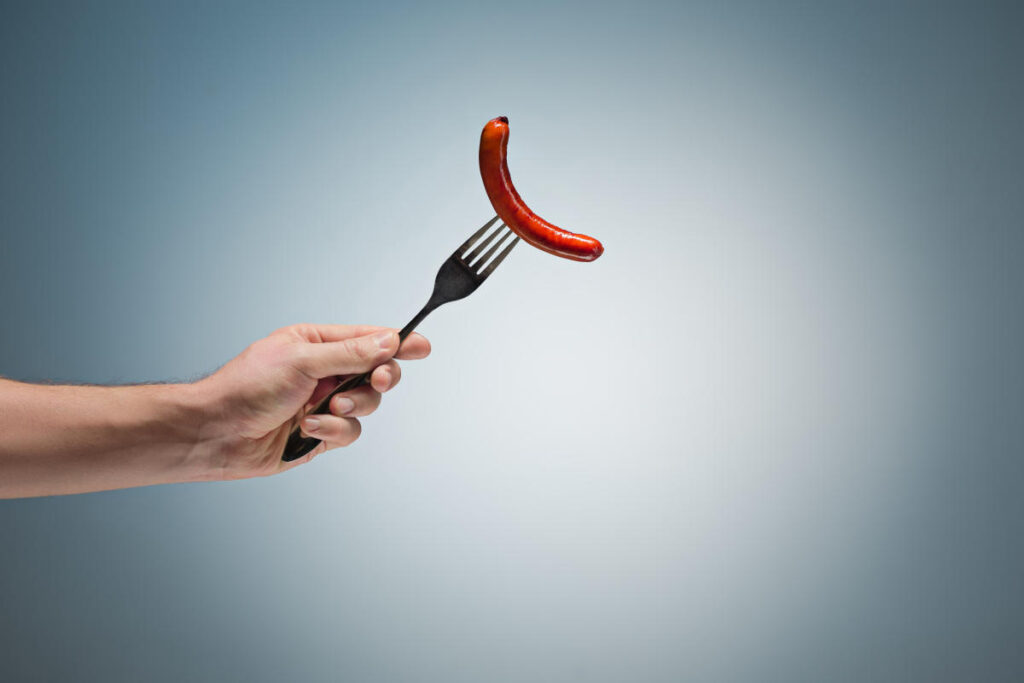You probably already know that ultra-processed foods are bad for you, but if you needed more evidence, new research suggests that consuming large amounts of highly processed meats, especially hot dogs and sausages, and sodas, could shorten your lifespan.
That’s the main conclusion of a new study that asked more than 540,000 people aged 50 to 71 in the mid-1990s to share information about their eating habits and health, and then followed them for more than 20 years.
In the study, presented at the Nutrition 2024 conference, researchers looked at mortality rates among participants, more than half of whom have died since the study began. They found that people who ate more ultra-processed foods were about 10% more likely to die from all causes, including heart disease and diabetes, over a 23-year period compared with people who ate more whole or minimally processed foods, like fresh fruits, vegetables, and milk. (It’s worth noting that study participants who ate ultra-processed foods were not more likely to die from cancer.)
Participants who ate more ultra-processed foods were more likely to have a higher body mass index and lower overall diet quality, but even among those classified as normal weight, the association between eating these foods and an increased risk of death remained.
But before you shun ultra-processed foods completely, another new study presented at the conference found that eating mostly minimally processed foods doesn’t necessarily mean a healthier diet: What’s more, these foods expire more than three times faster than ultra-processed foods and are more than twice as expensive.
The study authors also said that not all ultra-processed foods are bad, pointing out that some are highly nutritious, such as ultrafiltered milk, liquid egg whites, unsweetened applesauce, and certain brands of canned tomatoes.The researchers’ conclusion?The types of foods we eat may be more important than the degree of processing used to make them.
What else do you need to know about ultra-processed foods and your health? Below, several nutritionists explain.
What are ultra-processed foods?
“Ultra-processed foods are the furthest away from their natural state. They have multiple steps of processing and usually have five or more added ingredients, including preservatives and stabilizers,” Christy Brissette, R.D., nutritionist and owner of 80 Twenty Nutrition in Laguna Beach, California, tells Yahoo Life.
Many processed foods fall into this category, including pre-cooked pastas and pizzas, instant noodles and soups, processed meats (such as deli meats, hot dogs, sausages and nuggets), packaged snacks, candy, pastries, potato chips, sodas and energy drinks, etc. “But there are different levels of how processed foods are,” says Brissette.
Jessica Cording, R.D., a nutritionist and author of “The Little Book of Game-Changers: 50 Healthy Habits For Managing Stress & Anxiety,” says that many foods are processed to some degree. For example, bagged spinach is technically processed. “But there’s a difference between heavily processed foods and minimally processed foods,” Cording tells Yahoo Life.
Why are ultra-processed foods bad for you?
Some ultra-processed foods are less healthy overall, for a few reasons: “Ultra-processed foods tend to be higher in sodium, sugar, and fat,” says Brissette. “They’re often lower in essential nutrients, like fiber and vitamins, unless they’re added to the product.”
Eating large amounts of ultra-processed foods can mean not getting enough of the nutrients you need from other foods and “leading to excess intake of compounds that could lead to health concerns,” Cording said.
Studies have repeatedly linked ultra-processed foods to serious health problems including cardiovascular disease, type 2 diabetes, obesity and dementia.
So how should you eat it? Here’s what nutritionists recommend:
Brissett points out that it’s “nearly impossible” to eliminate all processed foods from your diet. “Some processed foods make it easier to eat healthy, and we don’t want to change that,” she says. “For example, you might not have time to soak and cook beans, but you can open a can and wash them. You get plant-based protein and fiber in your diet, and you’re not going to change that because of processed foods.”
Cording suggests aiming for an 85/15 approach to healthy eating, meaning you eat healthy foods 85% of the time, with room for the remaining 15%. “Ideally, you’ll eat nutritious, minimally processed foods, but there’s also room for processed foods,” Cording says.
She recommends thinking of ultra-processed foods as “special occasion foods” — that is, you eat them every now and then, but they don’t make up the majority of your diet. “From a mindset standpoint, that tends to work better for a lot of people,” she says. “Demonizing food and saying you can’t eat ultra-processed foods at all tends to create more problems.”
If you’re not sure if a processed food is healthy or unhealthy, Brissett suggests asking yourself how close it is to the original: “Bagged or frozen cauliflower with no other ingredients added is pretty close. Cauliflower crackers, not so much,” Brissett says.
When choosing packaged foods, Brissette recommends checking the ingredients list and choosing foods with minimal added salt, sugar, artificial sweeteners and hydrogenated oils. Look for foods that are low in added sugars and have less than 20% of your daily sodium intake, she says.
Ultimately, Cording says, “it’s OK to have a few processed foods in your diet, but it’s best to limit highly processed foods.”


